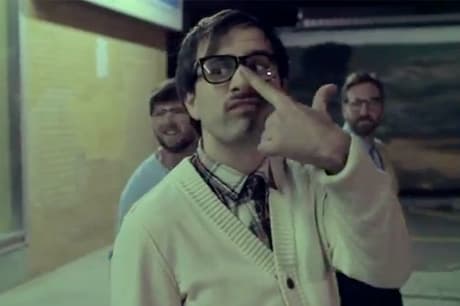From the programming to the panels, much of Sundance has been about the dire need for diversity in storytelling. Wildlife, the directorial debut from inescapably twee actor Paul Dano, accidentally bolsters that point. A dull, oblique adaptation of the Richard Ford novel of the same name, the film is a case study in white male mediocrity.
Jake Gyllenhaal and Carey Mulligan star as Jerry and Jeanette Brinson, a pair of straight-laced '50s Americans trying to build a life for their son Joe (The Visit's Ed Oxenbould, a mild-mannered stand-in for Dano). They've perpetually relocated around the country because Jerry can't seem to keep down a job, and they're now trying to settle in Great Falls, Montana.
Once again, he's let go from his job at a golf course in Montana (apparently for being too nice to the clientele), and his bruised pride leads him into a trap of alcoholism and self-pity. With no option seemingly good enough for him, he signs up to battle the forest fires outside of the city. You'd be forgiven for thinking the movie was called Wildfire for the entirety of its bloated runtime, although there is a moment where Gyllenhaal loudly exclaims, "What a wild life!"
Jerry's decision to fight the fires leads Jeanette to assume he's abandoned the family and, for lack of a better term, she loses her mind. She starts drinking during the day and keeps poor Joe away from his studies and his after-school job at a photo studio. Then she starts seeing an older businessman who promises to help her with the bills in exchange for some romantic rendezvous. Joe's also got a love interest at school. Or at least a girl he sits beside and talks to sometimes. She kind of just exists as a way to pass the time.
The performances in the film are not entirely awful, as Mulligan in particularly does an excellent job emoting the apparent agony she's in. She manages to go from motherly warmth to cold, distant shrieks in a number of scenes that would likely have an emotional impact if we knew what was going on or why she was acting that way.
Eventually, Jerry finds out Jeanette was stepping out on him and attempts to burn down the old businessman's house (reminder: the film is not called Wildfire). There are virtually no consequences for this or any other action in the film — it's just a series of events that are tied together with melodramatic performances and mediocre, often blown-out cinematography.
It'd be tempting to call the first-time feature from an established actor self-indulgent, but Dano never really seems to indulge in anything. In fact, the movie that was called Wildlife instead of Wildfire contains neither element of its titular contraction.
(Magic Child)Jake Gyllenhaal and Carey Mulligan star as Jerry and Jeanette Brinson, a pair of straight-laced '50s Americans trying to build a life for their son Joe (The Visit's Ed Oxenbould, a mild-mannered stand-in for Dano). They've perpetually relocated around the country because Jerry can't seem to keep down a job, and they're now trying to settle in Great Falls, Montana.
Once again, he's let go from his job at a golf course in Montana (apparently for being too nice to the clientele), and his bruised pride leads him into a trap of alcoholism and self-pity. With no option seemingly good enough for him, he signs up to battle the forest fires outside of the city. You'd be forgiven for thinking the movie was called Wildfire for the entirety of its bloated runtime, although there is a moment where Gyllenhaal loudly exclaims, "What a wild life!"
Jerry's decision to fight the fires leads Jeanette to assume he's abandoned the family and, for lack of a better term, she loses her mind. She starts drinking during the day and keeps poor Joe away from his studies and his after-school job at a photo studio. Then she starts seeing an older businessman who promises to help her with the bills in exchange for some romantic rendezvous. Joe's also got a love interest at school. Or at least a girl he sits beside and talks to sometimes. She kind of just exists as a way to pass the time.
The performances in the film are not entirely awful, as Mulligan in particularly does an excellent job emoting the apparent agony she's in. She manages to go from motherly warmth to cold, distant shrieks in a number of scenes that would likely have an emotional impact if we knew what was going on or why she was acting that way.
Eventually, Jerry finds out Jeanette was stepping out on him and attempts to burn down the old businessman's house (reminder: the film is not called Wildfire). There are virtually no consequences for this or any other action in the film — it's just a series of events that are tied together with melodramatic performances and mediocre, often blown-out cinematography.
It'd be tempting to call the first-time feature from an established actor self-indulgent, but Dano never really seems to indulge in anything. In fact, the movie that was called Wildlife instead of Wildfire contains neither element of its titular contraction.
